基于SSM的“家政预约管理系统”的设计与实现(源码+数据库+文档+PPT)
基于SSM的“家政预约管理系统”的设计与实现(源码+数据库+文档+PPT)
开发语言:Java
数据库:MySQL
技术:SSM
工具:IDEA/Ecilpse、Navicat、Maven
系统展示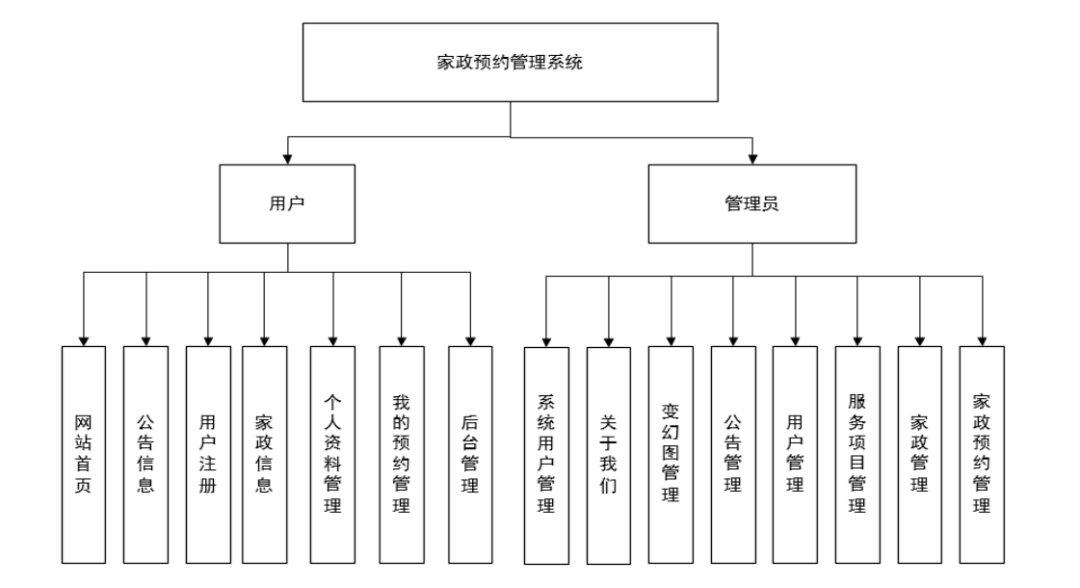
家政预约管理系统功能结构图

系统首页界面
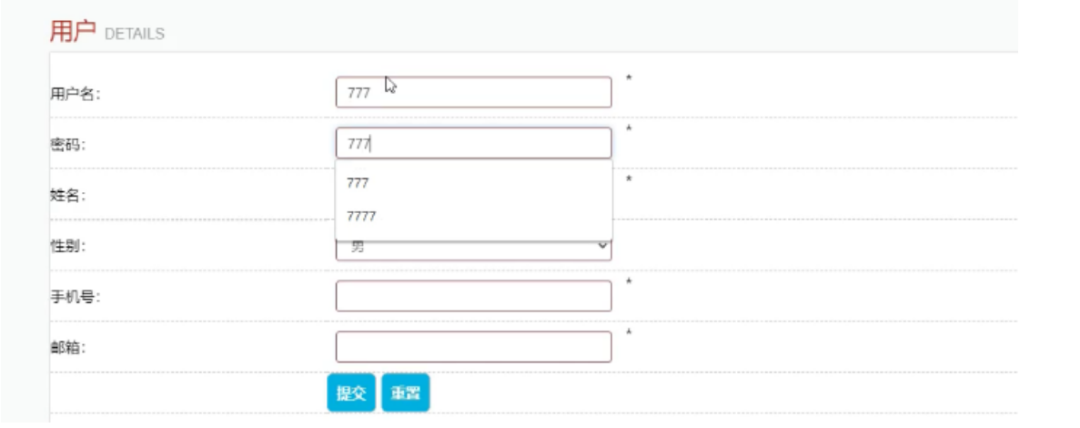
用户注册界面
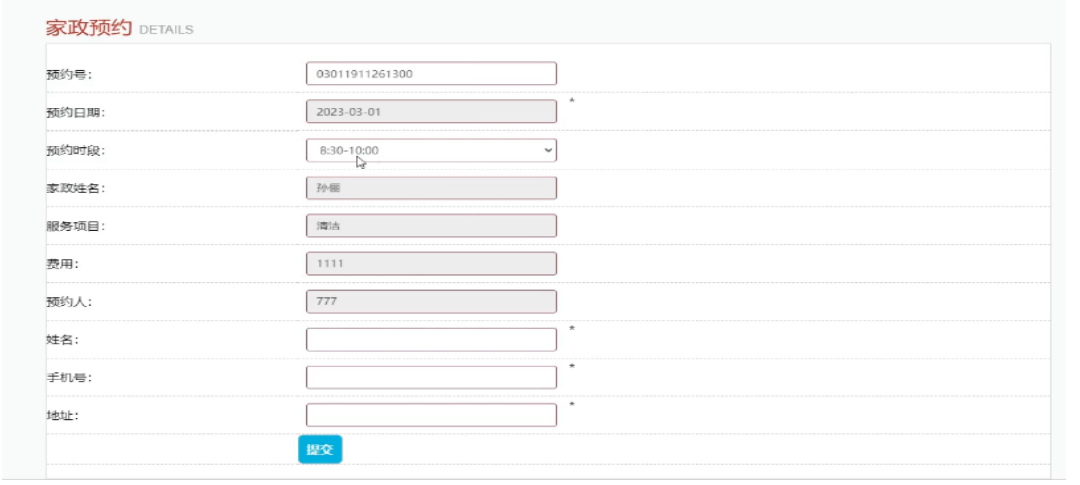
家政预约界面
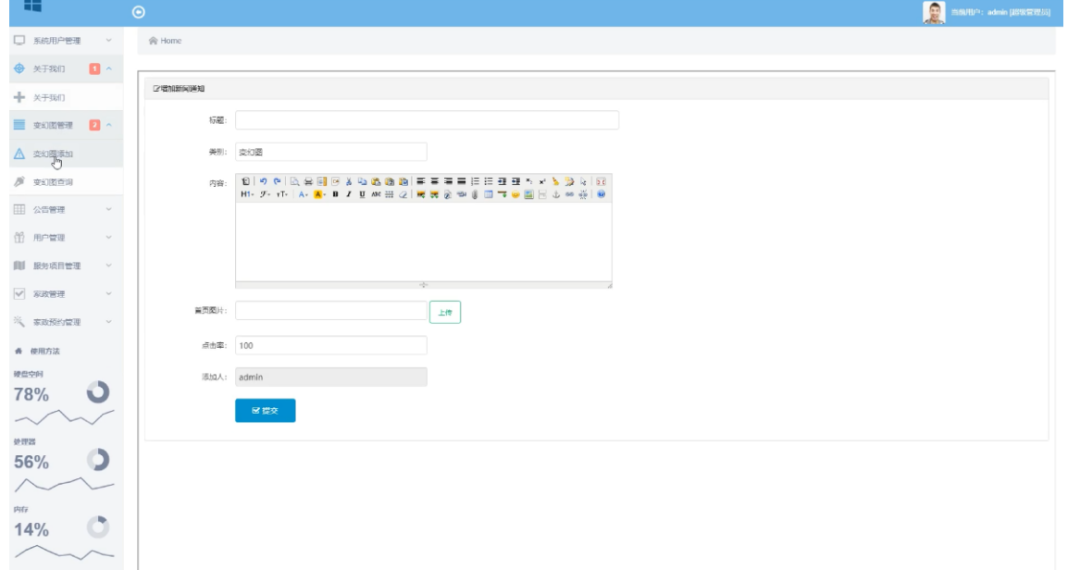
系统后台界面
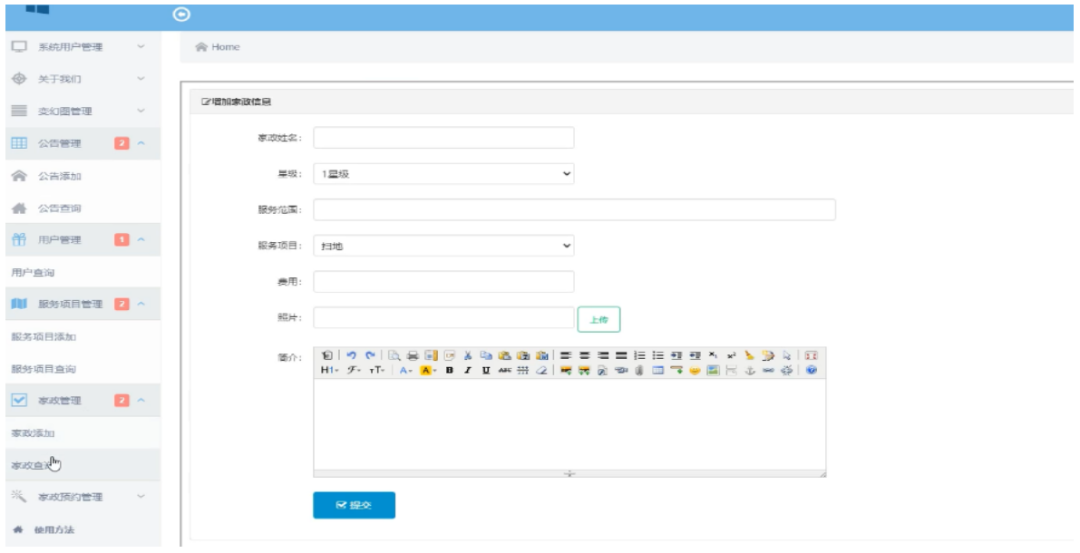
家政信息添加界面
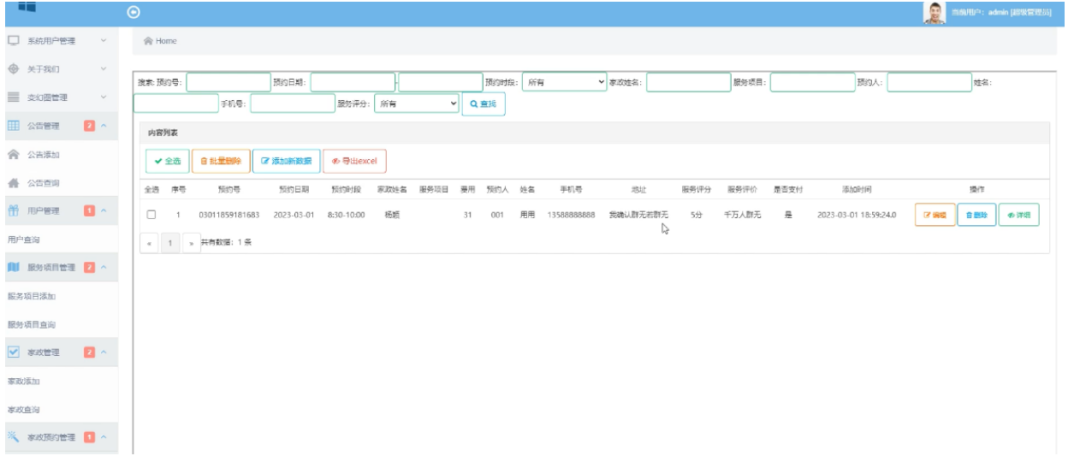
家政预约管理界面
摘要此次对于家政预约管理系统的开发设计主要基于家政服务内容管理以及家政服务在线预约功能的实现,系统开发设计主要借助JSP技术搭配SSM框架来实现,通过浏览器端实现在线的家政预约及家政服务信息传递,同时借助Mysql数据库的应用实现家政信息与预约信息的数据内容管理,通过数据逻辑关系的搭建来实现数据信息的有效传递和应用。通过家政预约管理系统平台的开发,帮助人们获取到更加全面的家政服务信息,同时也为人们的日常生活提供了便利。
研究背景云家政服务理念在互联网的推动下逐渐融入人们的日常生活,借助线上平台及手机APP可以实现在线的家政服务预约,相比传统的家政行业运营模式,线上平台为家政服务提供了更加广泛的客户群,同时可以帮助规避传统家政行业信息不同步的问题。因家政服务的涵盖领域较广泛,从基础的日常清洁再到月嫂钟点工服务项目内容相对繁杂,传统的手工记录登记的模式很容易出现记录上的偏差。因家政服务范围信息不明确而导致的家政服务纠纷非常普遍,同时在春节前的打扫旺季很容易出现预约记录不匹配的情况发生。传统的家政服务主要依托熟人介绍的方式来实现家政服务的提供,信息无法实现大范围的传播只能依托服务口碑来获得更多的潜在消费者,随着互联网系统平台的广泛应用很多平台也相继推出了在线家政服务预约服务,比如58同城等平台,可以帮助人们获取到全面的家政服务信息,相比传统的家政服务运营模式,线上个性化的家政服务平台可以让人们有效的获取到家政服务的信息,同时也简化了订单处理的流程,借助系统平台实现服务内容信息获取以及在线付款等操作,可以帮助家政行业实现更加清晰的服务流程,也帮助雇主规避服务内容漏洞及风险。
研究现状目前我国正处于互联网平台飞速发展的时期,同时线上平台的用户数量也在急速递增,借助线上平台用户量大且信息覆盖范围广的特性,目前很多服务为主的行业都陆续为用户提供了在线预约服务,想对于家政服务行业而言随着人们对家政需求的日益增加,家政服务行业的专业性也在不断的提升,家政服务人员需要通过严格的考核和认证才可以实现家政公司的对外派遣。当前比较主流的家政服务系统平台包括了好慷在家以及58同城等,将通过在线平台为用户提供更加全面的家政服务信息,在内容的呈现上主要按照家政服务的项目类别进行划分。同时随着人们应用需求的增加,互联网平台的很多家政服务内容存在虚假宣传的成分,为了帮助用户避免财产损失的风险,很多家政服务平台都实现了用户评价和在线打分,为用户提供了畅所欲言的平台,同时也可以通过线上的评价让家政服务公司了解到家政人员的实际工作情况,从而进一步提升家政服务的服务质量。
部分源码 @Controller public class LiuyanbanController { @Resource private LiuyanbanServer liuyanbanService; // @RequestMapping("showLiuyanban.do") public String showLiuyanban(int id,ModelMap map,HttpSession session){ /* Map<String,Object> bmap=new HashMap<String,Object>(); bmap.put("uid", id);*/ // map.put("blist", liuyanbanService.getAll(bmap)); map.put("liuyanban", liuyanbanService.getById(id)); return "read"; } @RequestMapping("addLiuyanban.do") public String addLiuyanban(HttpServletRequest request,Liuyanban liuyanban,HttpSession session){ Timestamp time=new Timestamp(System.currentTimeMillis()); //Users u=(Users)session.getAttribute("user"); /*if(u==null||u.equals("")){ return "redirect:showIndex.do"; }else{*/ liuyanban.setAddtime(time.toString().substring(0, 19)); liuyanbanService.add(liuyanban); session.setAttribute("backxx", "添加成功"); session.setAttribute("backurl", "lybList.do"); return "redirect:postback.jsp"; //return "redirect:liuyanbanList.do"; /*}*/ } // 处理编辑 @RequestMapping("doUpdateLiuyanban.do") public String doUpdateLiuyanban(int id,ModelMap map,Liuyanban liuyanban){ liuyanban=liuyanbanService.getById(id); map.put("liuyanban", liuyanban); return "liuyanban_updt"; } @RequestMapping("doUpdateLiuyanbanlb.do") public String doUpdateLiuyanbanlb(int id,ModelMap map,Liuyanban liuyanban){ liuyanban=liuyanbanService.getById(id); map.put("liuyanban", liuyanban); return "liuyanban_updtlb"; } @RequestMapping("updateLiuyanbanlb.do") public String updateLiuyanbanlb(int id,ModelMap map,Liuyanban liuyanban){ liuyanbanService.updatelb(liuyanban); return "redirect:liuyanbanList.do"; } // 后台详细 @RequestMapping("LiuyanbanDetail.do") public String LiuyanbanDetail(int id,ModelMap map,Liuyanban liuyanban){ liuyanban=liuyanbanService.getById(id); map.put("liuyanban", liuyanban); return "liuyanban_detail"; } // 前台详细 @RequestMapping("lybDetail.do") public String lybDetail(int id,ModelMap map,Liuyanban liuyanban){ liuyanban=liuyanbanService.getById(id); map.put("liuyanban", liuyanban); return "liuyanbandetail"; } // @RequestMapping("updateLiuyanban.do") public String updateLiuyanban(int id,ModelMap map,Liuyanban liuyanban){ liuyanbanService.update(liuyanban); return "redirect:liuyanbanList.do"; } // 分页查询 @RequestMapping("liuyanbanList.do") public String liuyanbanList(@RequestParam(value="page",required=false)String page, ModelMap map,HttpSession session,Liuyanban liuyanban, String cheng, String xingbie, String QQ, String youxiang, String shouji, String neirong, String huifuneirong){ /*if(session.getAttribute("user")==null){ return "login"; }*/ if(page==null||page.equals("")){ page="1"; } PageBean pageBean=new PageBean(Integer.parseInt(page), 15); Map<String, Object> pmap=new HashMap<String,Object>(); pmap.put("pageno", pageBean.getStart()); pmap.put("pageSize", 15); if(cheng==null||cheng.equals("")){pmap.put("cheng", null);}else{pmap.put("cheng", cheng);} if(xingbie==null||xingbie.equals("")){pmap.put("xingbie", null);}else{pmap.put("xingbie", xingbie);} if(QQ==null||QQ.equals("")){pmap.put("QQ", null);}else{pmap.put("QQ", QQ);} if(youxiang==null||youxiang.equals("")){pmap.put("youxiang", null);}else{pmap.put("youxiang", youxiang);} if(shouji==null||shouji.equals("")){pmap.put("shouji", null);}else{pmap.put("shouji", shouji);} if(neirong==null||neirong.equals("")){pmap.put("neirong", null);}else{pmap.put("neirong", neirong);} if(huifuneirong==null||huifuneirong.equals("")){pmap.put("huifuneirong", null);}else{pmap.put("huifuneirong", huifuneirong);} int total=liuyanbanService.getCount(pmap); pageBean.setTotal(total); List<Liuyanban> list=liuyanbanService.getByPage(pmap); map.put("page", pageBean); map.put("list", list); session.setAttribute("p", 1); return "liuyanban_list"; } @RequestMapping("lybList.do") public String lybList(@RequestParam(value="page",required=false)String page, ModelMap map,HttpSession session,Liuyanban liuyanban, String cheng, String xingbie, String QQ, String youxiang, String shouji, String neirong, String huifuneirong){ /*if(session.getAttribute("user")==null){ return "login"; }*/ if(page==null||page.equals("")){ page="1"; } PageBean pageBean=new PageBean(Integer.parseInt(page), 15); Map<String, Object> pmap=new HashMap<String,Object>(); pmap.put("pageno", pageBean.getStart()); pmap.put("pageSize", 15); if(cheng==null||cheng.equals("")){pmap.put("cheng", null);}else{pmap.put("cheng", cheng);} if(xingbie==null||xingbie.equals("")){pmap.put("xingbie", null);}else{pmap.put("xingbie", xingbie);} if(QQ==null||QQ.equals("")){pmap.put("QQ", null);}else{pmap.put("QQ", QQ);} if(youxiang==null||youxiang.equals("")){pmap.put("youxiang", null);}else{pmap.put("youxiang", youxiang);} if(shouji==null||shouji.equals("")){pmap.put("shouji", null);}else{pmap.put("shouji", shouji);} if(neirong==null||neirong.equals("")){pmap.put("neirong", null);}else{pmap.put("neirong", neirong);} if(huifuneirong==null||huifuneirong.equals("")){pmap.put("huifuneirong", null);}else{pmap.put("huifuneirong", huifuneirong);} int total=liuyanbanService.getCount(pmap); pageBean.setTotal(total); List<Liuyanban> list=liuyanbanService.getByPage(pmap); map.put("page", pageBean); map.put("list", list); session.setAttribute("p", 1); return "lyblist"; } @RequestMapping("deleteLiuyanban.do") public String deleteLiuyanban(int id,HttpServletRequest request){ liuyanbanService.delete(id); String url = request.getHeader("Referer"); return "redirect:"+url; //return "redirect:liuyanbanList.do"; } } 结论随着人们对于生活质量的要求不断增高,对于家政服务的需求内容也日益增加,然而传统的家政服务主要通过口口相传或者熟人介绍的方式来实现,同时也缺乏一定的规范性,家政服务内容的界定不够清晰容易引发雇主和家政人员的纠纷,家政服务的好坏也缺乏评判标准。人们对于家政需求的增加也进一步提升了家政服务的接单量,结合当前的市场需求和运营背景,家政服务行业逐渐形成了规模化和线上化,借助线上平台实现家政服务内容及标准的信息发布,让雇主清晰的了解家政服务的内容及收费标准,同时也有利于家政企业拓宽在线的客户群,依托用户打分机制来实现家政服务的隐性监管。
结合家政服务的应用现状,本文借助SSM框架结构以及JSP技术实现里家政预约管理系统平台的开发设计,通过系统平台的开发帮助缓解家政信息及服务项目内容传递闭塞的现状,同时通过流程化的预约服务打通雇主与家政人员的沟通壁垒,借助线上平台为消费者及家政企业提供更加便捷的沟通渠道。